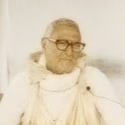by Srila Bhakti Raksaka Sridhara Maharaja
© Mandala Publishing
Sri Caitanya Mahaprabhu took shelter in the plane of jnana-sunya-bhakti. There our guardians will take care of us wholesale. To live under His guardianship is the best position for so many tiny souls. Give the responsibility of your own charge to the highest guardian. That is the most peaceful life, according to jnana-sunya-bhakti – surrender to such extremity, to such extent as forgetfulness of everything in the grace of the Almighty. To live there, in the automatic section of the world is the highest goal for living entities like us. Don’t take any responsibility.
There are different forms also. Mahaprabhu said to Ramananda “age kaho ara – go further.” Dasya, sakhya, vatsalya, madhurya, svakijya, parakiya – there is gradation. But the plane is all together, jnana-sunya, self-forgetfulness, the plane of self-forgetfulness, not just sacrifice. The Christian missionaries also say that: “Sacrifice is seen in the life of Socrates, but Christ’s recommendation, the plane of self-forgetfulness is higher than that.” Self-forgetfulness is higher than self-sacrifice. Self-sacrifice is the beginning, and then in a higher stage, self-forgetfulness. But that does not mean no sentient activity. In that plane also, fully conscious of their interest; different parties, competition, everything is there, but the background is such. And it is difficult to understand that background. Whatever we find here is there; but it is of the opposite type, and the original is the ideal type.
Keen competition is also there in that plane, but the foundation is self-forgetfulness. The peculiar thing is that Centre consciousness, and here selfishness of the plurality is the difference.
kama andha tama prema nirmal bhaskar
deko bhai kama preme vede naitabhu kama preme nahi hoy
Similar but opposite, that is to be understood. This is difficult – aprakrta. Prakrta just like this mundane plane, but it is not so, don’t mistake it. It is difficult. Everything appears like this mundane world, but it is all faithful to the Centre to the highest degree. Everything is done for the satisfaction of the Centre. And here everything is done for the satisfaction of so many meagre parts, local interest. Local interest, and universal interest; that is the distinction. You must put food into the stomach, not into the ear, or the eye, or anywhere else. It is sheer foolishness, to put food into the eye or ear for their nourishment; but to put food into the stomach is the highest intelligence.
pranopaharac ca yatendriyanam
tathaiva sarvarhanam acyutejya
Yasmin jnate sarvam idam “To know the Centre, and to do.” So, our Guru Maharaj said, “Religion is proper adjustment.” Adjustment with the whole, with the Centre, particularly. Proper adjustment, and keen competition is not eliminated in the adjustment. Adjustment does not mean a harmonious static condition, but this is dynamic to the fullest extent – still, it is harmonious. Harmony is not a static thing. Like a machine, when it is working, it is in harmony. The harmony has its test when the machine is working. When static, it is undetectable whether it is harmonious or not. But when in the dynamic condition, the harmony has its test. What is harmony? Movement, but no collision. Without collision, free movement of every part – that is harmony.
If not manipulated by intelligence, guided by intelligence, energy has no meaning. Guidance is necessary. Also guidance, or intelligence has no meaning if it does not connect with fulfilment, or satisfaction, or happiness, or sweetness, prema, love. Everything is meaningless if that aspect is eliminated from live. Fulfilment is in love, in beauty, in sweetness, in charm – sat cit anandam. Ananda, fulfilment, guidance next, then energy third: karma-jnana-bhakti. Without bhakti, the conclusion of everything is useless; no purpose is served. Bhakti is fulfilment, devotion, and devotion means acceptance of a higher entitiy. Bhagavan means bhajaniya sarva sad guna visista.
Jiva Gosvami gives this explanation of the word bhagavan. Another plane of life is opened. When we come in His connection, our heart wants to worship Him, to serve Him. He is of such qualification. You want to surrender, sacrifice, give yourself for the satisfaction of that thing – He is bhagavan. The third plane of life is open when we come in connection with the conception of bhagavan. Bhajaniya guna visista. He has got such qualities that automatically our aspiration will be to surrender, and to serve Him. We find a new plane of life.
We want that everything will serve us. That is the general tendency here. But if we come in connection with the conception of bhagavan, then at once the thing will be opposite: “I must serve Him.” From the core of the heart, such a wave will come: “He wants service? He should be served, by all means.” That plane will come in the heart. Bhagavan, bhajaniya guna visista.
Not self-aggrandizement, or survival of the fittest, tendency of elevation, all these disappear; and even the conception of complete retirement, that is also eliminated: “I shall enjoy retired life,” mukti, renunciation, a retired life of peace. Peace means retirement from a life of labour. But no, again some tendency awakens: “I must serve. I want a life to serve. I have come in connection with such a beautiful and noble conception, heavenly conception of the heart. Heart, such a heart I have noticed there. I cannot but give my heart to that.” Bhagavan.
And svayam bhagavan, what to speak of Him? Madly, everyone is mad to serve, to render Him service; that is the stage of svayam-bhagavan. Uddhava was astonished to find that. “We have some experience of surrendering, and serving the master; but such mad tendency to serve the master as I find in Vrndavan amongst the gopis, we can never imagine, we can never imagine in our life.” So, svayam-bhagavan, they have come in connection with svayam-bhagavan.
Bhagavan “as it is”, independent of the spectators. Swami Maharaj (A.C. Bhaktivedanta Swami Maharaj) wrote, Gita “As It Is.” Not modified by the different interpretations, or onlookers of different meanings, but “As It Is”. So, bhagavan as He is, free from the relative conceptions of so many, He is such. One who comes in connection with that, he becomes mad to serve. Self-forgetfulness means to completely merge; that is a class of merging. The mukti-kamis, the Salvationists, they speak of this physical merging, but real, living merging is there, life maintained but still merging. Visate tat anantaram.
marttyo yada tyaktva-samasta-karma niveditatman vicikirsito me
tad amrtatvam pratipadyamano mayatma-bhuyaya ca kalpate vai
That is not this physical, material merging in the dynamic characteristic of the Lord, not static merging. And they also merge, brahma-bhuyaya kalpate, they enter into the family life of the Lord. There is that sort of merging, in a dynamic system. To merge in a dynamic system, not in a static substance.
yadi gur na ha ‘ta tabe ki haita kemane dharitam de
“If Gauranga did not come with all these astonishing findings, then how could we live?” Vasudeva data says, “How could we live? The very vitality of our life He has taken out to us. The innermost vitality, that we are so great, so loving, so noble, if He did not come then who have shown to us our own nobility, that such a noble self is within us, such a dignified self is within us. We are so big, so great.”
Our Guru Maharaj at Dacca University, he gave as the heading of a lecture, “Gaudiya Math stands for the dignity of the human race, not slavery,” You fool, you think it is slavery, “Gaudiya Math preaches slavery.” It is not slavery as you understand it, but “the dignity of the human race.” That human soul, any soul, how from above he can get his chance, and he can rise up. Such prospect a jiva has, the adoration of the Almighty, of svayam-bhagavan.
As you give, so you have. So much giving, and so much having is also there. You think that svayam-bhagavan, God as He is, is bankrupt, that He is only gathering loans from different parties, but it is not so. Uddhava was astounded. Vasudeva data says, “Sri Gauranga has taken for us such a proud, wealthy, and noble self, our ideal position. Then how could we live if we could not come to know our much dignified position? Without doing that, that is a life of death. Without proper knowledge of one’s own self, one’s own wealth, one’s own noble self, that is a sort of life in death. He has given us our life.” Otherwise we could not have lived without knowing that we are so noble. Gauranga has come with these tidings for us. Now we realise that without that, we could not live. We have such a wonderful degree of fortune. And Gauranga is saying: “You Vasudeva, you people, you devotees, you do not know how great you are.” With these tidings He has come to our door.
And Nityananda Prabhu travelled from one door to another: “Accept Gauranga. You do not know what fortune is going, by you, on the road by your gate, ‘Don’t eliminate it.’ My friend, don’t eliminate it.’ Try to get it and your joy, your fortune, will know no bounds. Don’t avoid Gauranga.” Nityananda Prabhu carried this news from door to door. “Don’t avoid Gauranga. You know not what treasure He has taken for you. My friend, accept Him, take Him in, give yourself to Him. And you cannot estimate what fortune you will derive. Accept Him. Please accept Him.” This was the message of Nityananda, door to door.
He has an inner appreciation for this favourable breeze. Along the two sides of the Ganges river, Nityananda Prabhu appealed to all the villagers and inhabitants with the utmost earnestness. “Accept Gauranga! Accept Gauranga!”
bhaja gauranga, kaha gauranga, laha gauranger nama
je jana gauranga bhaje sei amara prana
“Accept Gauranga, and you will become the heart of my heart.”
This is the place (the math in Nabadwip). The most magnanimous expression came out here in Kuliya, when Gauranga absolved so many vaisanva-aparadhis, so many persons that had committed offenses against the Vaisnavas. Here in Kuliya and in Goverdhana we find Aparadha-bhanjan-pat. Aparadha, the greatest crime, was pardoned here, was forgiven here. So, I have selected this place for my temple. All the serious, grave offences will be forgiven here.
Goverdhana, Giriraja-Govardhana is a very favourite, selected abode of our Guru Maharaj. Radha-kuna is the highest, but there our guru, our senior, superior guides will stay, and we shall stay a little far off. We cannot encroach upon that highest position. From here we shall go and serve them and return. That is Govardhana.
In his last days our Guru Maharaj liked very much to hear this poem of Das Gosvami and Rupa Gosvami, nija niketa nivasam dehi govardhana tvam. And that is the meaning. Radha-kunda is the highest, but, pujala ragapata gauraba bange, giving respect to the highest position, to the superiors, we shall come down a little. So our pride will be a little checked and we can be in a normal position. I am not in the highest position, but a little lower, trying to climb higher. I am Vaisnava dasa, not Vaisnav. That is a very advantageous and intelligent position to be taken: “I am not a Vaisnava, I am Vasnava das.” The progress – kisora. That is the best position, only progressing, not fully attained, only going to get the full attainment. That position is good. Nija niketa nivasam dehi goverdhana tam. Swami Maharaj mentioned in his diary, or somewhere else, that once, during the circumambulation of Braja-mandala, in Koshi, Prabhupad (Srila Bhaktisiddhanta Saraswati Thakur) said: “This evening I shall give a class,” but many of the sannyasis went away to see the Sesa-sayi, and only a few remained to hear him. I heard from someone that Swami Maharaj mentioned that he stayed, I also stayed to hear Prabhupada, rather than go to some other place, and have darshan of Sesa-sayi.
Prabhupad himself said: “This evening I shall give the class.” But some remained and some left, because the next day we had to start in some other direction, and so that darshan was avoided. That other place was also an important place, where Laksmi Devi is serving Narayana – Sesa-sayi Narayana. When the Gopis went to see that place, they felt the highest degree of separation there.
yat te sujata caranamburuham stanesu
bhitah sanaih priya dadhimahi karkasesu
tenatavimatasi tad vathate na kim svit
kurpadibhir bhramati dhirbhavad asusam nah
(Srimad Bhagavatam 10.31.19)
There we heard from Prabhupad, a new meaning of Govardhana. He said that, “Just as the breeding of the cow section does not care for any social rules, so also the devotees of Krishna, they do not care for any social rules, but go on extending their group. Neither Brahmin, vaisya, sudra, ksatriya, chandala, mleccha, they do not care. Without caring for the social rules, they go on increasing their own group, their own section. Krsna-bhakti, Krsna conception, without caring for any state or environment they can try to continue to extend the thought of devotion, anywhere and everywhere, without caring for the yogyata, the capacity of the disciples.
akrstih krta-cetasam sumanasamuccatam camhasam
acandalamamukalokasulabho yasyas ca muktisriyah
no disam na ca satkriyam na ca puruscaryam managiksate
mantro ‘yam rasanasprg eva phalati sri krsnanamatmakah
(Chaitanya-charitamrta Madhya 15. 110)
The mantra, the sound of the name of Sri Krsna is so powerful, that it does not care for any capacity of the soil: it may be thrown down anywhere and it will sprout up, it is such a powerful seed. Akrstih krta-cetasam sumanasamuccatam camhasam. Only those that have some sort of previous sukrti are attracted and captured by this Krsna conception, the mantra of Krsna. When within the mantra the subject matter is Krsna, that only can attract a particular group.
As Achyutananda said to the local headmaster, when that head-master said: “We are so near, yet we cannot understand Mahaprabhu, but you have come, attracted from far away under the banner of Mahaprabhu. What is the cause?” Brahmanda brahmite kona bhagyavan jiva,” he answered. It is not a question of the locality, but in the whole of the brahmanda (universe) that peculiar qualification may be seen – krta-ceta. Those who have some sukrti, some sadhu-sanga in any form, only they are attracted from all sections. Only a select few are attracted.
And very easily the Krsna mantra can drive away sinful tendencies, very easily brush them away.









